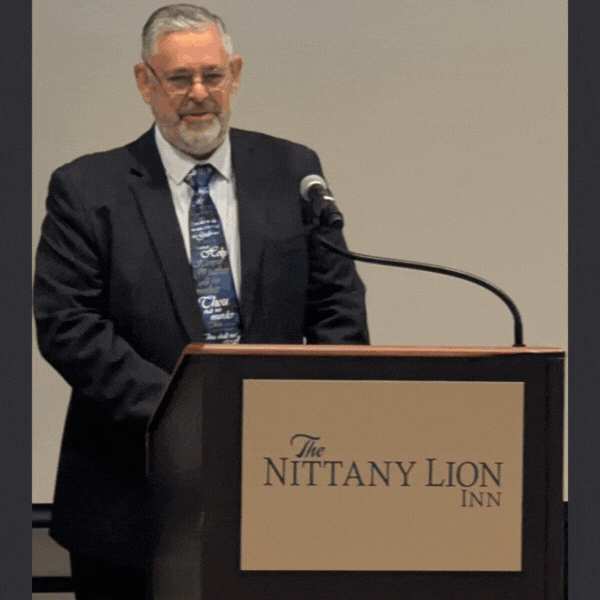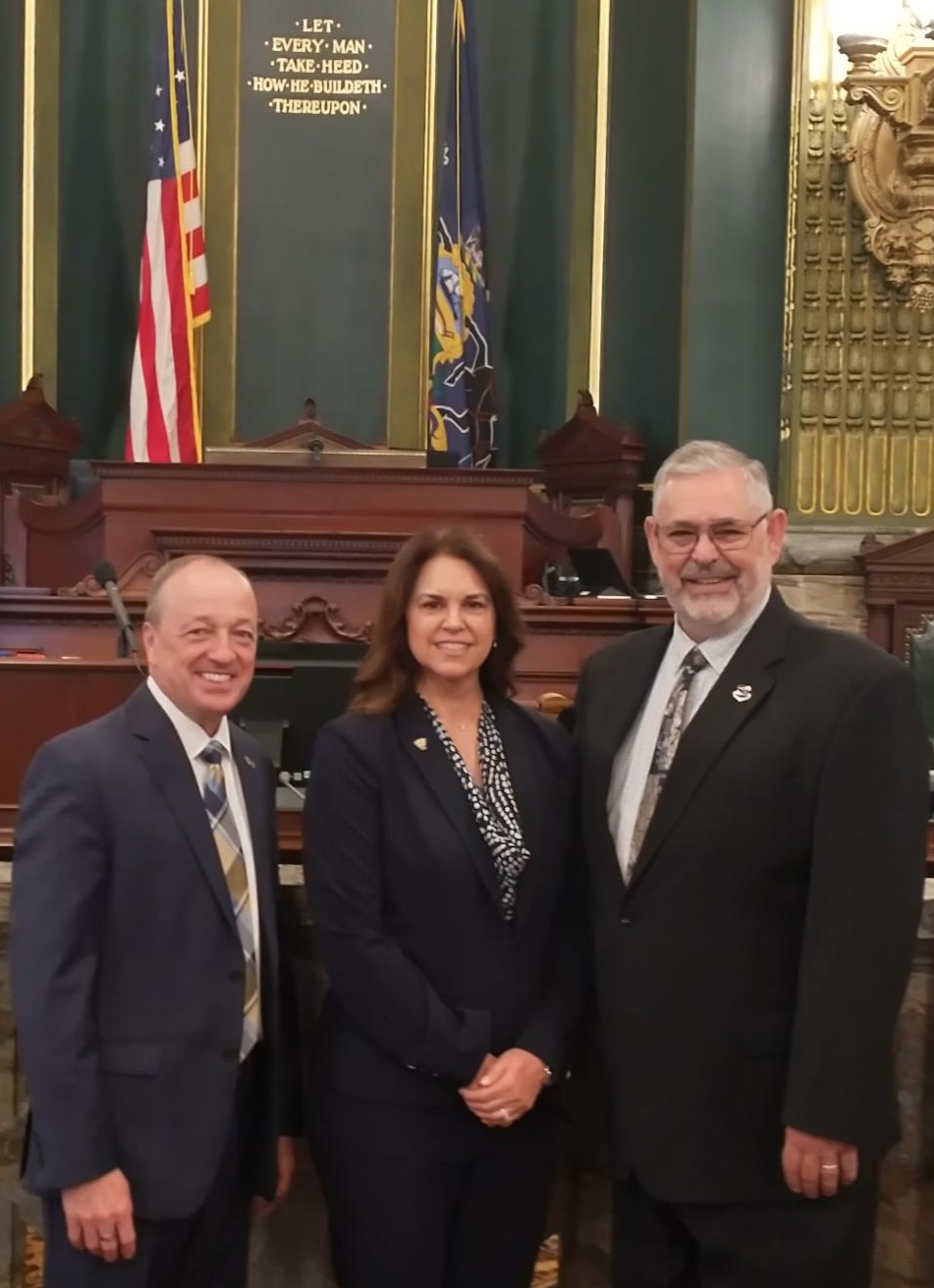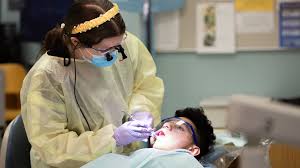
|
||||
|
In this Update:
Remembering Charlie Kirk at Penn State University
Shortly after the annual student-organized Sept. 11 memorial service, hundreds of people gathered on Penn State University’s Old Main Lawn for another candlelight vigil in remembrance of slain conservative activist Charlie Kirk. It was an honor to speak at his vigil and an encouragement for me as a State Senator to hear from so many Penn State students whose lives Charlie personally impacted and who remain determined to grow the movement he began. Unfortunately, Charlie’s assassination, while speaking at a campus event in Utah on Sept. 10, is just the latest in a series of politically motivated attacks. A few months ago, two state lawmakers in Minnesota were shot. Last summer, a bullet was just inches away from killing President Donald Trump. A few months later, a man was spotted hiding out with a rifle near Trump’s golf course. It is time for the lethal, stone-throwing rhetoric or “Socialist Dog Whistles” of calling people racists, bigots, homophobes, fascists, etc. to STOP! When Evil Cannot Refute Good, Evil Resorts to Violence! Tragically, another Humble, Kind, Selfless Warrior for Freedom was Taken from Us! The best way to address these senseless tragedies, begat and fueled by Leftist hate speech and indoctrination, is the way that Charlie addressed it…with love, peace and boldness in telling the truth. People right now are starving for truth. Again, what I’m seeing from the students at Penn State gives me a great deal of encouragement and hope for the future. The people behind the Socialist Dog Whistles have failed to motivate people like Charlie Kirk and others who truly love this country to act like them…Because by God’s Grace, WE ARE not like them! We must take the time to grieve. It’s right to do so. We must never forget our responsibility to stand up and finish the great work that Charlie started. Please keep Charlie’s family and friends in your prayers. Let’s also remember to pray for the person responsible for this assassination and his family. Rest in Peace, Charlie Kirk! Photo credits: Abby Drey, centredaily.com, onwardstate.com and statecollege.com. Constitution Day and Week Honor America’s Founding Principles
Today, Sept. 17, marks Constitution Day and the beginning of Constitution Week, which runs through Sept. 23. More than just a historical document, our Constitution is the foundation of our God-given freedoms and the guide that keeps our Republic strong. Our Constitution challenges We The People to do our part, to stay informed, speak up for what is right and protect the principles of liberty and justice that have shaped America for more than two centuries. Clearly, our Constitution is a gift from God. We need to understand this blessing. To understand it we need to read it; to read the words of those who were part of the conversation and the writing of it; to read the arguments of the framers who risked their lives and livelihoods for its ratification It is critical for each and every one of us to pass along the understanding of this revolutionary founding document and vigilantly protect the original intent of this gift for future generations. For extra motivation and more information about Taking Ownership of Your Constitutional Republic, click here to watch my video. Capitalizing on PA’s $80 Billion Opportunity in Critical Minerals, Rare Earth Elements Recovery
On Sept. 5, I had the privilege of welcoming my colleagues Pennsylvania Delegation Chairman Senator Gene Yaw, Senator Scott Martin, my district friend and partner PA State Rep. Kerry Benninghoff and other members of the Chesapeake Bay Commission to Senate District 25 and our Happy Valley. My presentation focused on exploring the innovations and advantages of Simultaneous Critical Minerals and Rare Earth Elements Recovery. Of course, one of the greatest challenges we face in maintaining the health and strength of the Chesapeake Bay is Acid Mine Drainage Remediation (AMD). Pennsylvania has more AMD sites than any other state—including more than 5,500 miles of AMD-impacted streams. The good news is that Senate District 25 is home to Penn State University’s outstanding Critical Minerals Program—which has not only developed technology to clean and restore our AMD-impacted waterways, but simultaneously to extract critical minerals and rare earth elements from the contaminated water. This technology creates the potential for a sustainable funding model — where the value of recovered critical mineral resources helps pay for long-term environmental stewardship. Additionally, these minerals and elements are sorely needed to counter China’s monopoly and stranglehold on these resources. Because of our Commonwealth’s God-given abundance of natural resources, the Keystone State has the largest opportunity in the nation to transform environmental challenges into economic security. As reported in last week’s edition of the Mission Report, Pennsylvania is beginning to take the lead in capitalizing on an $80 billion opportunity through critical minerals and rare earth elements recovery. By addressing AMD at its source — and by advancing technologies like those pioneered at Penn State we build lasting economic and environmental benefits. This is truly a win–win scenario: we restore Pennsylvania’s streams, we reduce pollution flowing into the Chesapeake Bay, and we strengthen our nation’s critical mineral supply chain. Best of all, the necessary ingredients and expertise are already available, right here, in the Happy Valley of Senate District 25. Rural Dental Desert Rescue Team Assembles at PA Capitol
With more than 3 million people residing in rural communities, Pennsylvania has the third-largest rural population in the United States, putting us at the center of the Dental Workforce Desert. Nearly half of the state’s rural counties — 45% of them — have 15 or fewer dentists each. According to a recent report compiled by the Center for Rural Pennsylvania, rural counties with the fewest dentists include: Forest (zero), Cameron (one), Sullivan (two), Fulton and Potter (three each), and Juniata (four). Fortunately, the University of Pittsburgh School of Dental Medicine is actively addressing the shortage of rural dental care providers across Pennsylvania by building educational and patient care programs that bring highly-qualified dental residents into those communities. Pitt Dental School Dean Marnie Oakley, DMD (pictured above) grew up in rural Pennsylvania and has consequently assembled a stellar plan to simultaneously train dental professionals and annually send them to complete their year-long residencies in three rural locations: Bradford (McKean County), Titusville (Crawford County) and Johnstown (Cambria County). Additionally, her team is working to create a hybrid on-site and on-line dental hygienist and dental assistant program at these same locations. The overall goal is to have some of these dental residents fall in love with Rural PA and decide to open-up a fully staffed local practice. Long term, Dean Oakley hopes to eventually open 10 or more Pitt Dental Medical Regional Training Centers across the Commonwealth. To help raise awareness and to gain support for the small amount of funding that is needed to support future regional training centers, my team and I organized key meetings for Dean Oakley and Associate Dean James Earle (pictured above) with individual lawmakers, legislative staff and stakeholder organizations at the state Capitol on Tuesday, Sept. 9. These included Sen. Scott Hutchinson, Sen. Wayne Langerholc, Centre for Rural Pennsylvania, Pennsylvania Dental Association, Pennsylvania Department of Community and Economic Development and Pennsylvania Department of Health. Protecting Animals from Painful Experiments
The Senate unanimously approved legislation aimed at protecting dogs and cats from painful, taxpayer-funded experiments. Senate Bill 381, also known as the Beagle Bill, would:
Senate Bill 381 now goes to the House of Representatives for consideration. Senate Approves Bill to Expunge COVID-Era Citations
The Senate approved legislation to expunge punitive COVID-related citations issued by the Pennsylvania Liquor Control Board (PLCB) against small businesses with liquor licenses. The bill was sent to the House of Representatives. Every other commonwealth agency has dropped enforcement actions for COVID-era rule violations, recognizing the difficult situation restaurants faced. However, the PLCB has been using its license renewal process to punish license holders for not complying with COVID-related executive orders. This includes issuing conditional licenses, which come with higher insurance premiums, and requiring the sale of a liquor license, effectively putting someone out of business. Senate Bill 241 would help local businesses by expunging COVID-related citations from the record of restaurants and bars that are under the purview of the PLCB. Importance of Community Pharmacies Highlighted at Briefing
Community pharmacies and the important role they play for Pennsylvania residents was the focus of an informational briefing with pharmacists, the state Department of Human Services, the Insurance Department and others. Roughly 600 pharmacies have closed across the commonwealth within the last two years, reducing access to professionals serving on the frontlines of health care. The Senate Community Pharmacy Caucus discussed the impacts of Act 77 of 2024, the Pharmacy Benefits Manager (PBM) reform measure. The law banned harmful practices, strengthened network adequacy requirements, increased PBM transparency and accountability and implemented additional oversight. Further action needed to protect community pharmacies was among the topics explored at the briefing, which can be viewed here. Helping Disabled Veterans Enjoy Outdoor Activities
The Senate passed legislation supporting opportunities for Pennsylvania’s disabled veterans to participate in outdoor traditions. Senate Bill 533 would streamline requirements for hunting and furtaking licenses and refine special permits for regulated hunting grounds to specifically benefit disabled veterans who take part in hunting events. The legislation makes it easier for organizations to host hunts for disabled veterans by clarifying the permitting process and reducing unnecessary barriers, ensuring more veterans can be included in these events. Senate Bill 533 was sent to the House of Representatives for consideration. School Bus Bill Improves Safety for Pennsylvania Children
Legislation to improve school bus safety and better protect children traveling to and from school was approved by the Senate. Senate Bill 65 increases the required stopping distance from 10 feet to 15 feet for drivers approaching from the opposite direction when a school bus is stopped with its red lights flashing. It also raises penalties for violations, including higher fines and license suspensions for repeat offenders, and mandates additional driver education or examinations. It also establishes penalties for drivers who fail to prepare to stop when a school bus activates its flashing amber lights, adding an important layer of accountability. During Operation Safe Stop in October 2024, law enforcement and bus drivers across 22 school districts reported 131 violations in a single day, underscoring the urgency of these reforms.
For anyone who hasn’t already signed up to receive my mission reports, you can get on the e-newsletter mailing list here. |
||||
|
||||






Want to change how you receive these emails? 2026 © Senate of Pennsylvania | https://senatordush.com | Privacy Policy |










